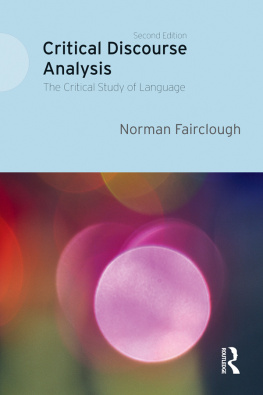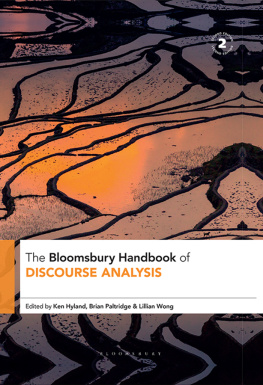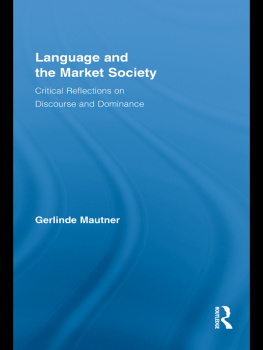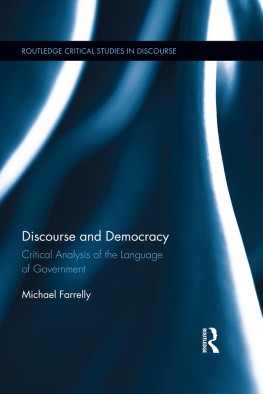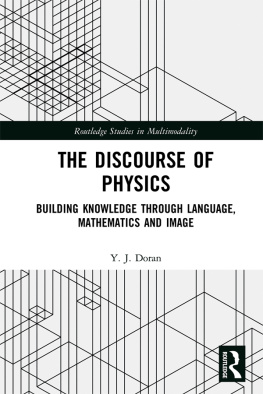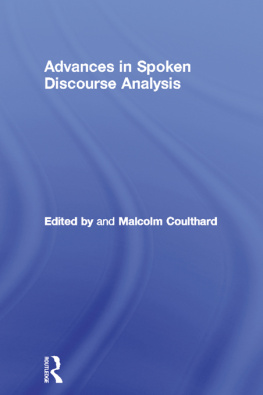Critical Discourse Analysis
Critical Discourse Analysis
The Critical Study of Language
Second edition
NORMAN FAIRCLOUGH

First published 1995 by Pearson Education Limited
Second edition published 2010
Published 2013 by Routledge
2 Park Square, Milton Park, Abingdon, Oxon OX14 4RN
711 Third Avenue, New York, NY 10017, USA
Routledge is an imprint of the Taylor & Francis Group, an informa business
Copyright 1995, 2010, Taylor & Francis.
The right of Norman Fairclough to be identified as author of this work has been asserted by him in accordance with the Copyright, Designs and Patents Act 1988.
All rights reserved. No part of this book may be reprinted or reproduced or utilised in any form or by any electronic, mechanical, or other means, now known or hereafter invented, including photocopying and recording, or in any information storage or retrieval system, without permission in writing from the publishers.
Notices
Knowledge and best practice in this field are constantly changing. As new research and experience broaden our understanding, changes in research methods, professional practices, or medical treatment may become necessary.
Practitioners and researchers must always rely on their own experience and knowledge in evaluating and using any information, methods, compounds, or experiments described herein. In using such information or methods they should be mindful of their own safety and the safety of others, including parties for whom they have a professional responsibility.
To the fullest extent of the law, neither the Publisher nor the authors, contributors, or editors, assume any liability for any injury and/or damage to persons or property as a matter of products liability, negligence or otherwise, or from any use or operation of any methods, products, instructions, or ideas contained in the material herein.
ISBN 13: 978-1-4058-5822-9 (pbk)
British Library Cataloguing in Publication Data
A CIP catalogue record for this book can be obtained from the British Library
Library of Congress Cataloging in Publication Data
A CIP catalog record for this book can be obtained from the Library of Congress
Set by 35 in 11/13pt Bulmer MT
C ritical Discourse Analysis, in its first edition in 1995, along with its predecessor Language in Power, created in the world of applied linguistics and discourse analysis a way and a means of systematically approaching the relationships between language and social structure which has now not only extended across those worlds but also had its impact across social science more generally. It would be no exaggeration to say that those two books, along with Norman Faircloughs other key texts, notably Discourse and Social Change, and his numerous papers and edited collections, changed the face of the social analysis of language.
Critical Discourse Analysis in its first edition offered a range of students of linguistics, applied linguistics and language study, as well as communication research in professions and organisations more generally, a framework and a means of exploring the imbrications between language and social-institutional practices, and beyond these, the intimate links between language as discourse and broader social and political structures. A key innovation at that time was to critique some of the premises and the constructs underpinning mainstream studies in sociolinguistics, conversation analysis and pragmatics to demonstrate the need of these disciplines to engage with issues of power and hegemony in a dynamic and historically informed manner, while at the same time insisting on the dynamic and polysystemic description of language variation. Indeed, the focus on the dynamics of discourse has proved especially productive for students of professional discourses such as those of law, politics, social work, healthcare, language and literacy education. This is very much a consequence of his viewing critical discourse analysis as relational research. Indeed, making interrelations matter (whether among, and within, institutions of the social order and between them, or the social formation more generally) links serendipitously with applied linguistic calls in recent years for just such connections. Indeed, Norman Fairclough has offered those practitioners whose work is most obviously discoursed and languaged a means whereby they, now often in collaboration with critical discourse analysts, can describe, interpret and proffer explanations how their practices are discursively accomplished, suggesting a way of clarifying the ideologically informed bases of the purposes and methods of the professions themselves. At the same time, his focus on the dialecticsof discourse does not just provide a motivation for intellectual debate, but also directly engages the understanding of interdiscursivityand its relation to those semiotic modalities within and through which interdiscursivity is realised, highlighting what he calls the two-way flow of discourse to and from sociological/political constructs such as hegemony and power. Here again, his formulations speak directly to applied linguists engaged in understanding the focal themes of contemporary social institutions. His discussion in this new edition of how participants, in his terms, construe their worlds, and how they reflexively seek to change aspects of such worlds, to reconstruct them, offers considerable backing to those researchers and participants intent on pursuing a reflexive and critical agenda. Workers in the fields of communication in healthcare, social work, language and literacy education, restorative justice, political agency, have come to rely on his formulations and theorising almost as a manifesto for action. I use the word manifesto in its true sense; as a statement of commitment to principle but also as a blueprint for practical action. This is important if we are not to regard critical discourse analysis, as Norman Fairclough manifestly does not, as merely a politically inspired approach to analysing language, as it were, reading and seeking to change society off the page. Nothing could be further from the truth as this new edition, greatly expanded with more recent papers and new sections, makes abundantly clear.
The papers in this collection represent a formidable treatise on critical discourse analysis from perhaps its leading exponent. To strike a personal note, they go back to the early days of the formulation of such ideas when we were colleagues at Lancaster; but now greatly enhanced both in terms of their scope, their theoretical base, and also their influence. They provide the basis for understanding the theoretical underpinnings of critical discourse analysis but also the substance and warrant of its immense influence on research practice.
What are the key elements of this new edition for applied linguists engaged with the critical exploration of discourse? Readers will discover many. For me, firstly, it is the insistence throughout on what Norman refers to as trans-disciplinary research. This is not merely to be seen, however, as forging links between discourse study and sociology, politics, anthropology, inter alia, central though that is to his theme, it is also trans-professional in enabling discourse workers to collaborate with workers in other fields and disciplines in a programme of exploring praxis. There are now rather many examples of just such transdisciplinary work. Secondly, it is the engagement of structure with strategy again not necessarily at all focused on the macro contexts of the social formation, though clearly Normans work speaks to that directly, but also in the exploration of the micro interactional order, addressing how strategic actions always are imbued with the influences of the institutional structural order, however naturalised. Here Norman Fairclough comes closest to the work of Bourdieu and of Cicourel, though with a distinctive engagement: one might venture to say this is the key trio underpinning current work in applied linguistics. Readers of the first edition of
Next page
